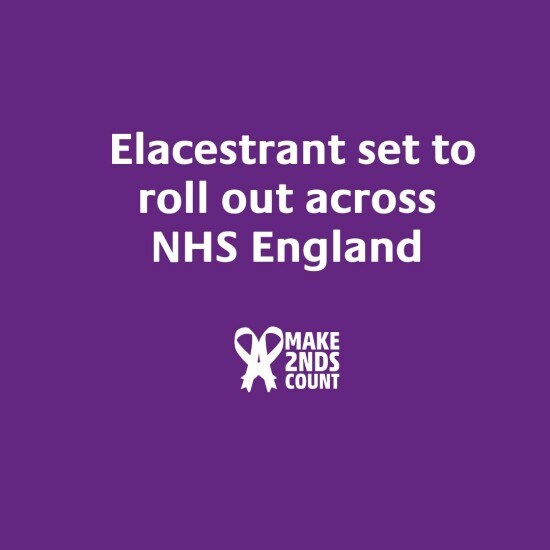19th December 2024 by Clare Cox

We are pleased that Elacestrant has been recommended by NICE as a treatment for ER positive HER2-negative metastatic breast cancer patients across England today.
Approximately 70% of secondary (metastatic) breast cancer patients have the ER-positive HER2-negative sub-type, making it the most common type of breast cancer. After
prolonged hormone treatment, up to 50% of patients can develop an activating mutation
(genetic change) in the oestrogen receptor gene (ESR1) for which there is no current targeted treatment.
Today NICE have announced that they are recommending Elacestrant as a treatment option for those living with this sub-type and the ESR1 mutation whose cancer has worsened after 12 months with hormone (endocrine) therapy, plus a CDK 4 and 6 inhibitor. This means Elacestrant will not be available for those that do not fit this criteria, and only available through NHS England.
Disease progression tends to be faster for those with the ESR1 mutation so a targeted treatment has been long in discussion, and we were pleased to be one of the stakeholders in the drug consultation process earlier this year alongside Breast Cancer Now and MetUp UK.
To be prescribed Elecestrant, patients will need to fit the criteria and have blood plasma specimens taken to confirm the ESR1-mutation through CTDNA testing. We have some concerns as a charity about how the NHS will make this testing available to our community as it is not a routine UK-wide procedure.
Make 2nds Count CEO Sam Dixon said: "Elacestrant is welcome news for those in our community who have the ER-positive HER2-negative subtype. Our vision is to see everyone with secondary (metastatic) breast cancer living longer, better lives and more options being made available on the NHS UK-wide. Where you live in the UK should not determine what treatments are available for you. We have had a very small part to play in shaping this decision but we are determined to work with other charities and organisations in the breast cancer sector moving forward to influence the decisions for more targeted treatments being there for those who need it."
Although the criteria for Elecestrant will only help a small contingency of our community, we are pleased to see some positive news and a difference being made to those we support. We have been heartbroken to see proven life-extending treatments for secondary breast cancer not being recommended for use on the NHS in recent times, and are delighted that voices from our community have been heard.
To find out more, visit NICE website